2024届高三英语二轮复习 语法之时态(一)课件(共50张PPT)
文档属性
| 名称 | 2024届高三英语二轮复习 语法之时态(一)课件(共50张PPT) |
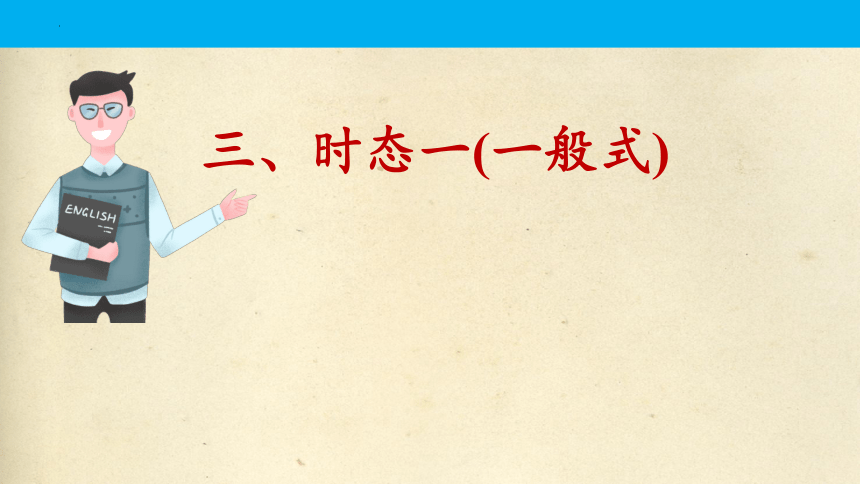
|
|
| 格式 | pptx | ||
| 文件大小 | 3.5MB | ||
| 资源类型 | 教案 | ||
| 版本资源 | 通用版 | ||
| 科目 | 英语 | ||
| 更新时间 | 2024-05-21 00:00:00 | ||
图片预览

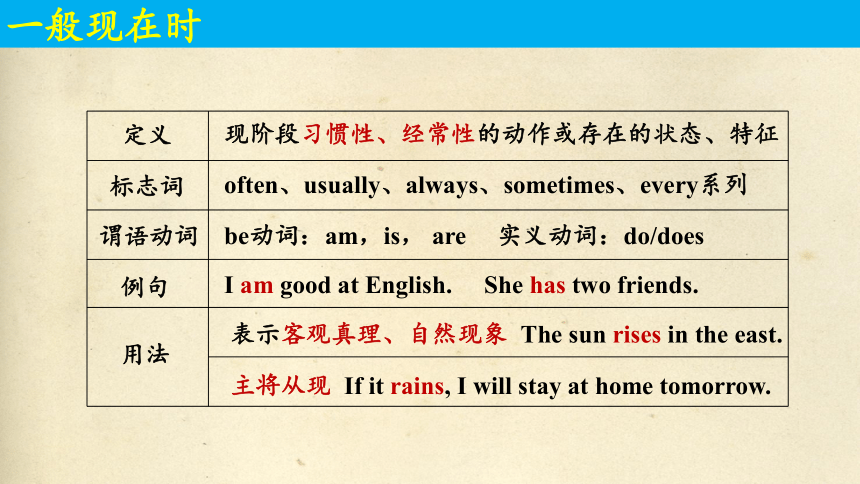
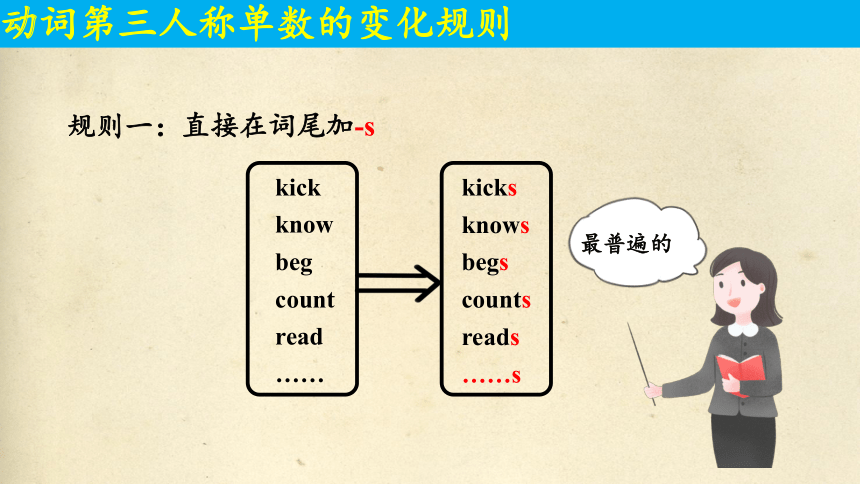
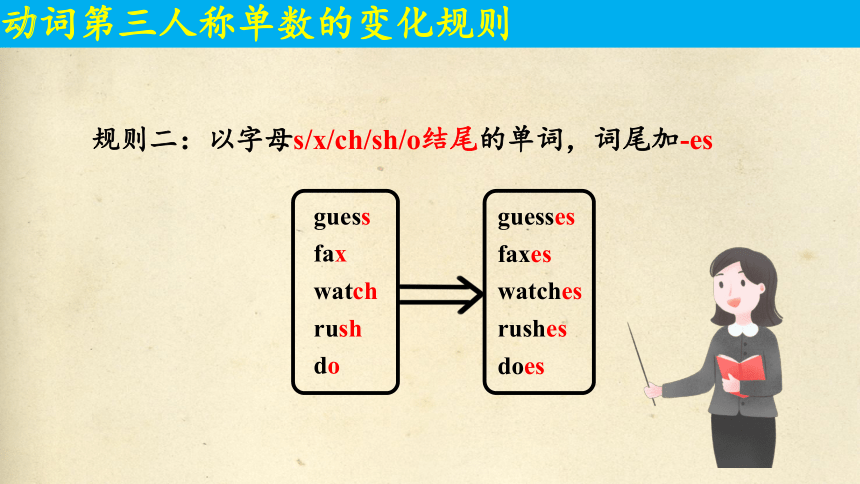
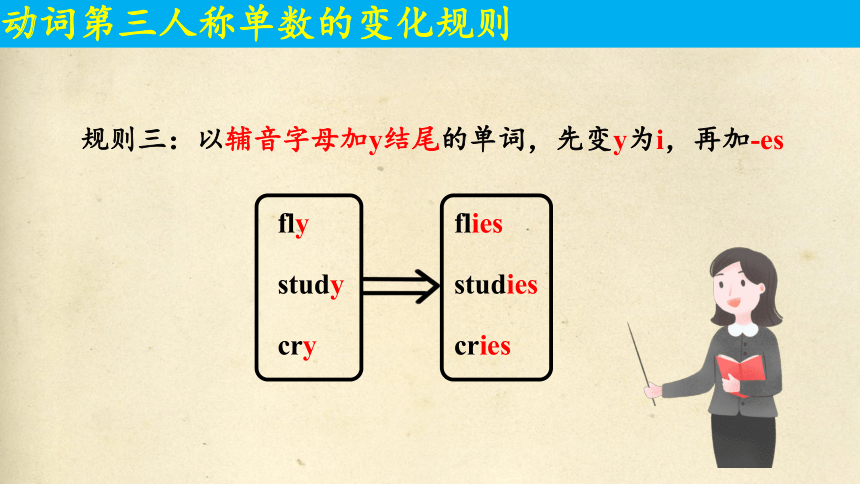
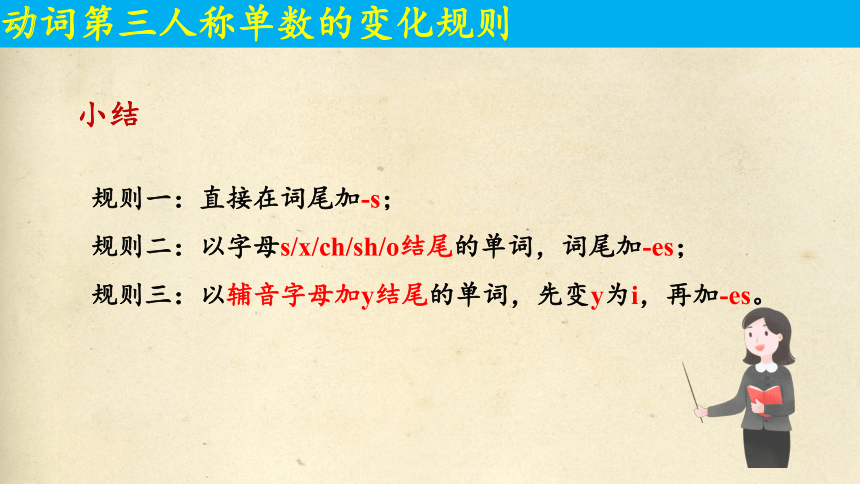
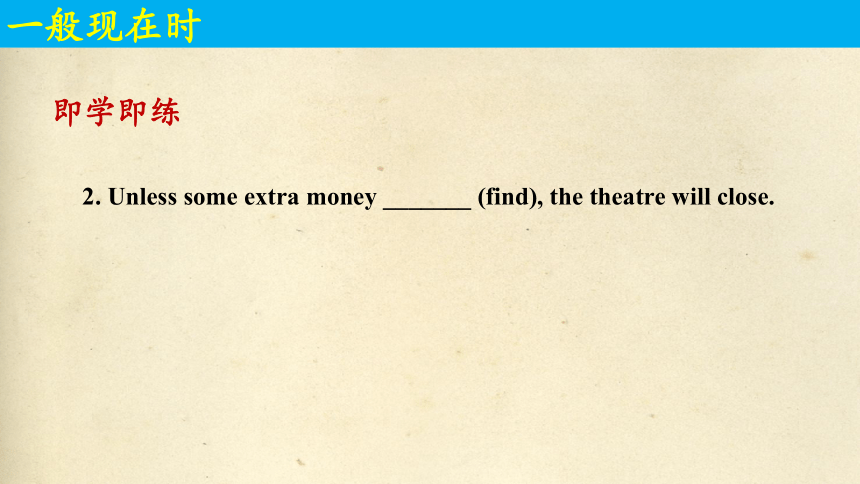
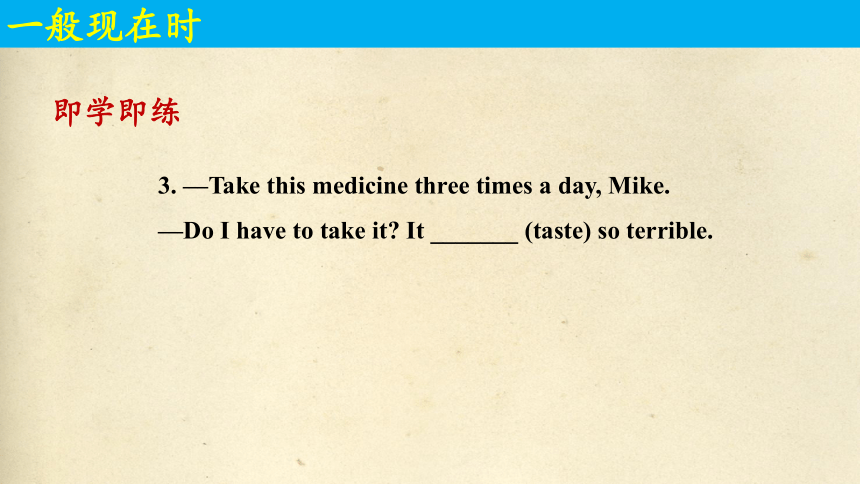

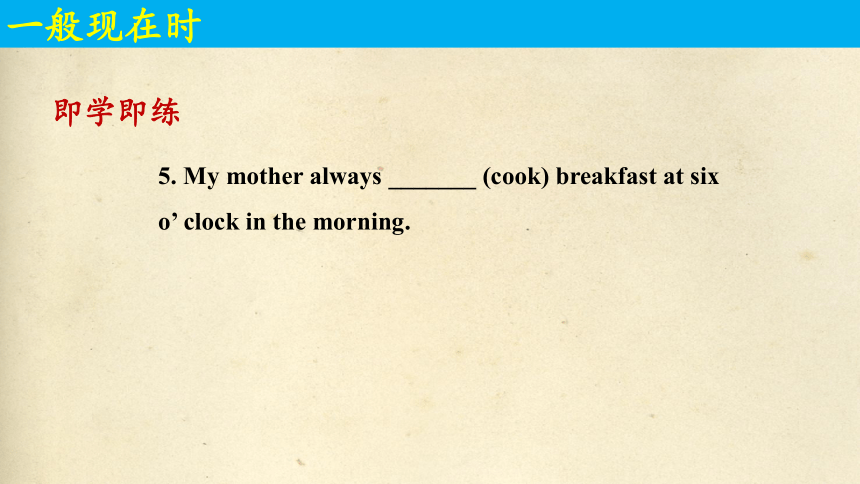
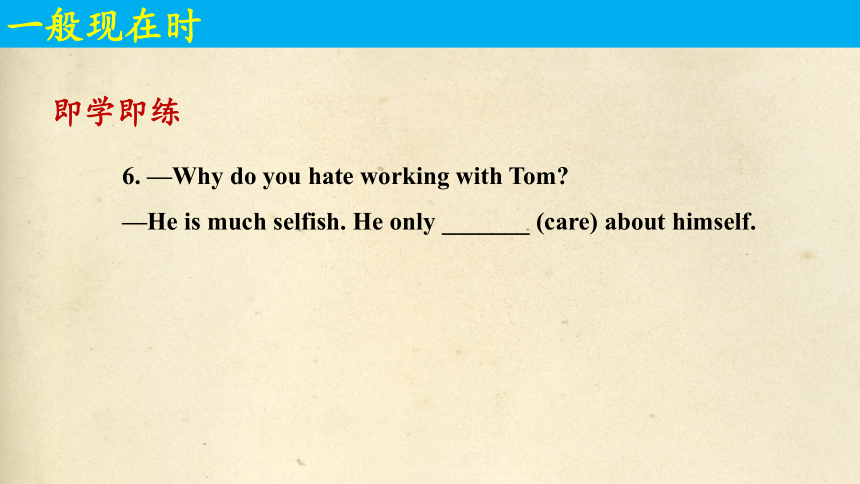
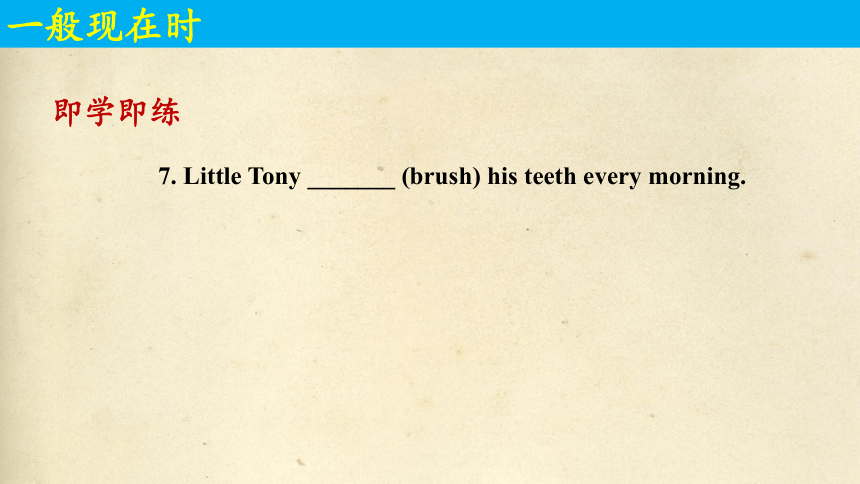
文档简介
(共50张PPT)
三、时态一(一般式)
一般现在时
定义
标志词
现阶段习惯性、经常性的动作或存在的状态、特征
often、usually、always、sometimes、every系列
例句
I am good at English.
She has two friends.
表示客观真理、自然现象 The sun rises in the east.
主将从现 If it rains, I will stay at home tomorrow.
用法
谓语动词
be动词:am,is, are 实义动词:do/does
动词第三人称单数的变化规则
规则一:
直接在词尾加-s
最普遍的
kick
know
beg
count
read
……
kicks
knows
begs
counts
reads
……s
规则二:以字母s/x/ch/sh/o结尾的单词,词尾加-es
guess
fax
watch
rush
do
guesses
faxes
watches
rushes
does
动词第三人称单数的变化规则
规则三:以辅音字母加y结尾的单词,先变y为i,再加-es
fly
study
cry
flies
studies
cries
动词第三人称单数的变化规则
规则一:直接在词尾加-s;
规则二:以字母s/x/ch/sh/o结尾的单词,词尾加-es;
规则三:以辅音字母加y结尾的单词,先变y为i,再加-es。
小结
动词第三人称单数的变化规则
2. Unless some extra money _______ (find), the theatre will close.
即学即练
一般现在时
3. —Take this medicine three times a day, Mike.
—Do I have to take it It _______ (taste) so terrible.
即学即练
一般现在时
4. If we _______ (act) now to protect the environment, we’ll live to regret it.
即学即练
一般现在时
5. My mother always _______ (cook) breakfast at six
o’ clock in the morning.
即学即练
一般现在时
6. —Why do you hate working with Tom
—He is much selfish. He only _______ (care) about himself.
即学即练
一般现在时
7. Little Tony _______ (brush) his teeth every morning.
即学即练
一般现在时
8. The sun _______ (rise) in the east and sets in the west.
即学即练
一般现在时
9. Eric’s father told him that Christmas Day always _______ (fall) on December 25th.
即学即练
一般现在时
一般过去时
定义
标志词
表示过去发生的动作或存在的状态
yesterday、just now、in+过去年份、two days ago、last系列
例句
I was good at English.
She had two friends.
主过将从过 He would call me as soon as he arrived.
用法
谓语动词
be动词:was,were 实义动词:did
动词过去式变化规则
变化规则 动词原形 动词过去式
一般加-ed work want act ____________
____________
____________
以e结尾的词加-d live move decide ____________
____________
____________
以“辅音字母+y”结尾的词,改y为i,再加-ed study cry fly ____________
____________
____________
一般加-ed
work
want
act
____________
____________
____________
以e结尾的词加-d
live
move
decide
____________
____________
____________
以“辅音字母+y”结尾的词,改y为i,再加-ed
study
cry
fly
____________
____________
____________
worked
wanted
acted
lived
moved
decided
studied
cried
flied
变化规则 动词原形 动词过去式
以“元音字母+y”结尾的词,直接加-ed play enjoy stay ____________
____________
____________
以重读闭音节或r音节结尾,末尾只有一个辅音字母的词,要双写这个辅音字母,再加-ed stop beg plan prefer star bar ____________
____________
____________
____________
____________
____________
以“元音字母+y”结尾的词,直接加-ed
play
enjoy
stay
____________
____________
____________
以重读闭音节结尾,而且末尾只有一个辅音字母的词,要双写这个辅音字母,再加-ed
stop
beg
plan
____________
____________
____________
played
enjoyed
stayed
stopped
begged
planned
动词过去式变化规则
cut
cut
keep
kept
know
knew
leave
left
……
也有不规则变化的哦!
动词过去式变化规则
1. Mary ________ (read) English yesterday morning.
一般过去时
即学即练
2. Tom ________ (begin) to learn Chinese last year.
一般过去时
即学即练
3. Last year the teacher ________ (tell) us that the earth moves
around the sun.
一般过去时
即学即练
4. There ________ (be) any hospitals in my hometown in 1940.
一般过去时
即学即练
5. My grandfather ________ (leave) Hong Kong for New York in 1998.
一般过去时
即学即练
6. ---What do you do, Susan
---I am a clerk in a foreign company now. But I ________ (teach) English in a high school for 8 years.
一般过去时
即学即练
7. When I was in university, I ________ (feel) at a loss what to do
in the future for a long time.
一般过去时
即学即练
8. The traffic was heavy this morning, but Dad ________ (manage) to
get to the office on time.
一般过去时
即学即练
9. Mark Zuckerberg, founder of Facebook, ________ (decide) to donate
a lot of money to charity when his daughter was born.
一般过去时
即学即练
10. Simon looks worried because he ________ (enter) a writing competition and now he's waiting for the result.
一般过去时
即学即练
一般将来时
定义
标志词
表示将来某个/段时间将要发生的动作或存在的状态
tomorrow、in the future、in+将来年份、next系列
例句
I will/am going to visit Guangzhou next week.
用法
谓语动词
will/be going to do;
be to do; be about to do
主将从现 If it rains, I will stay at home tomorrow.
1. Next week, each student in the class ________ (receive) a small gift from their teachers.
一般将来时
即学即练
2. With the development of science and technology, robot cooks ________ (appear) in our families in the future.
一般将来时
即学即练
3. Look on the bright side of life, and imagine that you ________ (have) a happy and successful future.
一般将来时
即学即练
4. Many scientists believe that robots ________ (be) able to talk like humans in 50 years.
一般将来时
即学即练
5. My aunt ________ (take) me to Europe for vacation next month.
一般将来时
即学即练
6. The old woman believes her children ________ (come) back next year.
一般将来时
即学即练
7. If it is clear tomorrow, I ________ a bike to the underground station.
一般将来时
即学即练
8. There ________ (be) a football match on TV tonight. I can't wait to watch it.
一般将来时
即学即练
9. If you want to visit the Palace Museum, I ________ (book) tickets for you tomorrow.
一般将来时
即学即练
10. I'm glad to hear you ________ (move) to a new house next week.
一般将来时
即学即练
过去将来时
定义
标志词
过去时与将来时同时出现
例句
用法
谓语动词
would do
从过去的某一时间来看将要发生的动作和存在的状态。
He said he would study Chinese next year.
主过将从过 He would call me as soon as he arrived.
1. When we lived in Hangzhou ten years ago, we ________ (go) for a walk after dinner.
过去将来时
即学即练
2. —What did Alice say
—She said she ________ (call) me at eight o'clock tomorrow morning.
过去将来时
即学即练
3. Tim told us that his company ________ (use) robots to do some of the work.
过去将来时
即学即练
4. When I was a baby, Mom ________ (sing) for me after feeding me.
过去将来时
即学即练
5. He told me that he ________ (visit) the Great Wall the next day.
过去将来时
即学即练
6. Too many people were absent. The chairperson warned that he ________ (cancel) the meeting if necessary.
过去将来时
即学即练
7. Jerry told me he ________ (operate) on an old man's eyes in the hospital this Sunday.
过去将来时
即学即练
8. At college, Barack Obama didn't know that he ________ (become) the first black president of the United States of America.
过去将来时
即学即练
9. Mother promised she ________ (buy) me an English-Chinese dictionary.
过去将来时
即学即练
10. It was believed that the TV series The Legend of Miyue ________ (attract) millions of people soon.
过去将来时
即学即练
三、时态一(一般式)
一般现在时
定义
标志词
现阶段习惯性、经常性的动作或存在的状态、特征
often、usually、always、sometimes、every系列
例句
I am good at English.
She has two friends.
表示客观真理、自然现象 The sun rises in the east.
主将从现 If it rains, I will stay at home tomorrow.
用法
谓语动词
be动词:am,is, are 实义动词:do/does
动词第三人称单数的变化规则
规则一:
直接在词尾加-s
最普遍的
kick
know
beg
count
read
……
kicks
knows
begs
counts
reads
……s
规则二:以字母s/x/ch/sh/o结尾的单词,词尾加-es
guess
fax
watch
rush
do
guesses
faxes
watches
rushes
does
动词第三人称单数的变化规则
规则三:以辅音字母加y结尾的单词,先变y为i,再加-es
fly
study
cry
flies
studies
cries
动词第三人称单数的变化规则
规则一:直接在词尾加-s;
规则二:以字母s/x/ch/sh/o结尾的单词,词尾加-es;
规则三:以辅音字母加y结尾的单词,先变y为i,再加-es。
小结
动词第三人称单数的变化规则
2. Unless some extra money _______ (find), the theatre will close.
即学即练
一般现在时
3. —Take this medicine three times a day, Mike.
—Do I have to take it It _______ (taste) so terrible.
即学即练
一般现在时
4. If we _______ (act) now to protect the environment, we’ll live to regret it.
即学即练
一般现在时
5. My mother always _______ (cook) breakfast at six
o’ clock in the morning.
即学即练
一般现在时
6. —Why do you hate working with Tom
—He is much selfish. He only _______ (care) about himself.
即学即练
一般现在时
7. Little Tony _______ (brush) his teeth every morning.
即学即练
一般现在时
8. The sun _______ (rise) in the east and sets in the west.
即学即练
一般现在时
9. Eric’s father told him that Christmas Day always _______ (fall) on December 25th.
即学即练
一般现在时
一般过去时
定义
标志词
表示过去发生的动作或存在的状态
yesterday、just now、in+过去年份、two days ago、last系列
例句
I was good at English.
She had two friends.
主过将从过 He would call me as soon as he arrived.
用法
谓语动词
be动词:was,were 实义动词:did
动词过去式变化规则
变化规则 动词原形 动词过去式
一般加-ed work want act ____________
____________
____________
以e结尾的词加-d live move decide ____________
____________
____________
以“辅音字母+y”结尾的词,改y为i,再加-ed study cry fly ____________
____________
____________
一般加-ed
work
want
act
____________
____________
____________
以e结尾的词加-d
live
move
decide
____________
____________
____________
以“辅音字母+y”结尾的词,改y为i,再加-ed
study
cry
fly
____________
____________
____________
worked
wanted
acted
lived
moved
decided
studied
cried
flied
变化规则 动词原形 动词过去式
以“元音字母+y”结尾的词,直接加-ed play enjoy stay ____________
____________
____________
以重读闭音节或r音节结尾,末尾只有一个辅音字母的词,要双写这个辅音字母,再加-ed stop beg plan prefer star bar ____________
____________
____________
____________
____________
____________
以“元音字母+y”结尾的词,直接加-ed
play
enjoy
stay
____________
____________
____________
以重读闭音节结尾,而且末尾只有一个辅音字母的词,要双写这个辅音字母,再加-ed
stop
beg
plan
____________
____________
____________
played
enjoyed
stayed
stopped
begged
planned
动词过去式变化规则
cut
cut
keep
kept
know
knew
leave
left
……
也有不规则变化的哦!
动词过去式变化规则
1. Mary ________ (read) English yesterday morning.
一般过去时
即学即练
2. Tom ________ (begin) to learn Chinese last year.
一般过去时
即学即练
3. Last year the teacher ________ (tell) us that the earth moves
around the sun.
一般过去时
即学即练
4. There ________ (be) any hospitals in my hometown in 1940.
一般过去时
即学即练
5. My grandfather ________ (leave) Hong Kong for New York in 1998.
一般过去时
即学即练
6. ---What do you do, Susan
---I am a clerk in a foreign company now. But I ________ (teach) English in a high school for 8 years.
一般过去时
即学即练
7. When I was in university, I ________ (feel) at a loss what to do
in the future for a long time.
一般过去时
即学即练
8. The traffic was heavy this morning, but Dad ________ (manage) to
get to the office on time.
一般过去时
即学即练
9. Mark Zuckerberg, founder of Facebook, ________ (decide) to donate
a lot of money to charity when his daughter was born.
一般过去时
即学即练
10. Simon looks worried because he ________ (enter) a writing competition and now he's waiting for the result.
一般过去时
即学即练
一般将来时
定义
标志词
表示将来某个/段时间将要发生的动作或存在的状态
tomorrow、in the future、in+将来年份、next系列
例句
I will/am going to visit Guangzhou next week.
用法
谓语动词
will/be going to do;
be to do; be about to do
主将从现 If it rains, I will stay at home tomorrow.
1. Next week, each student in the class ________ (receive) a small gift from their teachers.
一般将来时
即学即练
2. With the development of science and technology, robot cooks ________ (appear) in our families in the future.
一般将来时
即学即练
3. Look on the bright side of life, and imagine that you ________ (have) a happy and successful future.
一般将来时
即学即练
4. Many scientists believe that robots ________ (be) able to talk like humans in 50 years.
一般将来时
即学即练
5. My aunt ________ (take) me to Europe for vacation next month.
一般将来时
即学即练
6. The old woman believes her children ________ (come) back next year.
一般将来时
即学即练
7. If it is clear tomorrow, I ________ a bike to the underground station.
一般将来时
即学即练
8. There ________ (be) a football match on TV tonight. I can't wait to watch it.
一般将来时
即学即练
9. If you want to visit the Palace Museum, I ________ (book) tickets for you tomorrow.
一般将来时
即学即练
10. I'm glad to hear you ________ (move) to a new house next week.
一般将来时
即学即练
过去将来时
定义
标志词
过去时与将来时同时出现
例句
用法
谓语动词
would do
从过去的某一时间来看将要发生的动作和存在的状态。
He said he would study Chinese next year.
主过将从过 He would call me as soon as he arrived.
1. When we lived in Hangzhou ten years ago, we ________ (go) for a walk after dinner.
过去将来时
即学即练
2. —What did Alice say
—She said she ________ (call) me at eight o'clock tomorrow morning.
过去将来时
即学即练
3. Tim told us that his company ________ (use) robots to do some of the work.
过去将来时
即学即练
4. When I was a baby, Mom ________ (sing) for me after feeding me.
过去将来时
即学即练
5. He told me that he ________ (visit) the Great Wall the next day.
过去将来时
即学即练
6. Too many people were absent. The chairperson warned that he ________ (cancel) the meeting if necessary.
过去将来时
即学即练
7. Jerry told me he ________ (operate) on an old man's eyes in the hospital this Sunday.
过去将来时
即学即练
8. At college, Barack Obama didn't know that he ________ (become) the first black president of the United States of America.
过去将来时
即学即练
9. Mother promised she ________ (buy) me an English-Chinese dictionary.
过去将来时
即学即练
10. It was believed that the TV series The Legend of Miyue ________ (attract) millions of people soon.
过去将来时
即学即练
